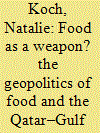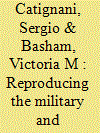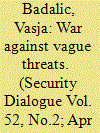|
|
|
Sort Order |
|
|
|
Items / Page
|
|
|
|
|
|
|
| Srl | Item |
| 1 |
ID:
178187


|
|
|
|
|
| Summary/Abstract |
On 4 June 2017, Qatar was suddenly put under an embargo by its regional neighbors – an effort spearheaded by Saudi Arabia and the UAE, who cut off most of its existing land, sea, and air traffic routes. With no domestic agriculture to speak of, Qatar’s external logistics networks are essential for maintaining its food supply. The country’s 2.6 million residents, many of whom flooded the grocery stores, were understandably concerned about their ability to secure food when news about the embargo broke. Eventually, new food supply chains were established, primarily with the assistance of partners in Iran and Turkey. The ongoing rift between Qatar and its neighbors in the Arabian Peninsula, manifested only in part by this effort to undermine the country’s material supply networks raises a number of questions about an old idea: that of food as a ‘weapon’. This article puts this concept in historical and regional perspective in the Arabian Peninsula through the lens of critical geopolitics, tracing the securitizing discourses about food security and their intertwining with narratives about territorial sovereignty, nationalism, and essentialist understandings of geography to explain the causes and effects of the food embargo in the ongoing Qatar–Gulf rift.
|
|
|
|
|
|
|
|
|
|
|
|
|
|
|
|
| 2 |
ID:
178188


|
|
|
|
|
| Summary/Abstract |
International relations scholarship has paid insufficient attention to security providers’ tendency to emulate the visual attributes of other actors in an attempt to (re)construct their identities and increase their legitimacy by signalling adherence to prevailing norms. Research on the discourses deployed by private military and security companies (PMSCs), for instance, has relied almost exclusively on the analysis of written documents. This article argues that even basic visual units like logos serve as windows into the genealogy and evolution of the international market for force. By combining insights from Peircean semiotics and institutionalist theory, I show that PMSCs’ logos are not only marketing tools, but also symbolic acts that shed light upon the shifting identities and legitimization strategies of the international private security industry. Specifically, I argue that PMSCs’ logos can be conceptualized as forms of camouflaging, blame-shifting, mirroring and socialization into corporate identities. These overlapping processes have reshaped the international private security industry brandscape, informing a shift away from the use of logos displaying symbols and colours borrowed from military visual identity systems.
|
|
|
|
|
|
|
|
|
|
|
|
|
|
|
|
| 3 |
ID:
178186


|
|
|
|
|
| Summary/Abstract |
The notions that military violence engenders security and that military service is a selfless and necessary act are orthodoxies in political, military and scholarly debate. The UK Army Reserve’s recent expansion prompts reconsideration of this orthodoxy, particularly in relation to the suggestion that reservists serve selflessly. Drawing on fieldwork with British Army reservists and their spouses/partners, we examine how this orthodoxy allows reservists to engage in everyday embodied performances, and occasionally articulations, of the need to serve, in order to free themselves up from household responsibilities. This supposed necessity of military service necessitates heteropatriarchal divisions of labour, which facilitate participation in military service and the state’s ability to conduct war/war preparations. However, while reserve service is represented as sacrificial and necessary, it is far more self-serving and is better understood as ‘serious leisure’, an activity whose perceived importance engenders deep self-fulfilment. By showing that the performances of sacrifice and necessity reservists rely on are selfish, not selfless, we show how militarism is facilitated by such everyday desires. We conclude by reflecting on how exposing reserve service as serious leisure could contribute to problematizing the state’s ability to rely on everyday performances and articulations of militarism and heteropatriarchy to prepare for and wage war.
|
|
|
|
|
|
|
|
|
|
|
|
|
|
|
|
| 4 |
ID:
178189


|
|
|
|
|
| Summary/Abstract |
While resistance has been increasingly studied in critical security studies, its role has been mainly understood as either a deconstructive or a reconstructive force in processes of securitization owing to the perceived externality of resistance to domination. By contributing to the governmentality approach to security with Foucault’s concept of counter-conduct, this article aims to explicate a particular mode of resistance in which the securitized subject resists, not by refusing the status of being securitized, but by counter-securitizing the self. In doing so, the article shows how dominating and resisting actors mutually construct a particular issue as security. The utility of the concept of counter-conduct is empirically examined via the case of Tunisia, where the unemployed have been securitized in the context of counter-terrorism since the 2011 uprising. By analysing the narratives of the ruling elites and unemployed protesters collected from local news, Facebook posts and semi-structured interviews conducted by the author between 2016 and 2017, the article illustrates how protesters actively participated in the securitization of the unemployed in order that they might be able to continue their socio-economic struggle and position their right to work as the most efficient way of fighting terrorism.
|
|
|
|
|
|
|
|
|
|
|
|
|
|
|
|
| 5 |
ID:
178190


|
|
|
|
|
| Summary/Abstract |
This article explores how the United States (US) has redefined the concept of ‘imminent threat’ in order to relax the rules for anticipatory use of armed force against insurgents. The article focuses on how two new definitions of imminent threat have changed the conduct of specific combat activities, namely, drone strikes and ground combat operations.
The central part of the article is divided into four sections. The first section examines the redefinition of imminent threat in the context of drone warfare, while the second section provides an analysis of the redefinition of imminent threat in ground combat operations. Both sections show how the new definitions of imminent threat abandoned two key elements of the classic definition, that is, the immediacy and certainty of the threat. The third and fourth sections of the article explore how the new definitions of imminent threat prevented the application of two key principles governing the use of armed force: the principles of necessity and proportionality. Both sections show how successive US administrations enabled the US military to conduct operations without observing these two key principles regulating the use of force.
|
|
|
|
|
|
|
|
|
|
|
|
|
|
|
|
|
|
|
|
|